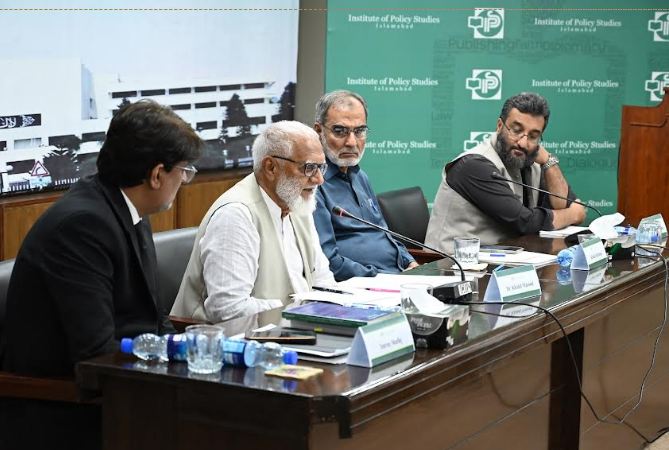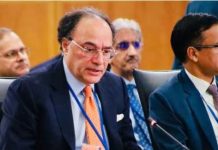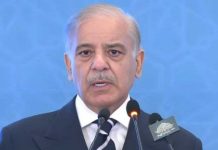ISLAMABAD, JUL 2 /DNA/ – International law should be harmonized with Islamic teachings and grounded in the local context, shaped by cultural sensitivities, and upheld through democratic legitimacy. Though global engagement is essential, bypassing parliamentary oversight in the adoption of international conventions risks eroding legislative authority and cultural coherence. Only a thoughtful, context-driven adaptation can ensure relevance, inclusivity, and sustainable impact.
This was discussed at a seminar hosted by the Institute of Policy Studies (IPS), Islamabad, titled “Pakistan’s Constitutional Framework and International Law,” which brought together prominent legal scholars and practitioners from Pakistan, Malaysia, and Bangladesh. The event, organized in collaboration with GIFT University, Gujranwala, explored the intersection of Islamic jurisprudence and modern international legal standards within Pakistan’s constitutional context.
Khalid Rahman, chairman IPS, cited Pakistan’s unique constitutional trajectory and noted that the country’s legal system represents a purposeful synthesis of Islamic values and global legal norms. Emphasizing that tradition and modernity need not be in conflict, he stressed, “Pakistan’s Constitution is a model that aspires to harmonize religious imperatives with contemporary international standards.” Acknowledging the judiciary’s pivotal role in actualizing this harmony, he pointed out the persistent skepticism shaped by both internal contradictions and external misperceptions.
Dr. Khalid Masood, member Shariat Appellate Bench at the Supreme Court of Pakistan and former chair of the Council of Islamic Ideology, delved into the concept of universality, contrasting the universals of Western nation-states with those rooted in Islamic tradition. He critiqued the modern polarization of knowledge and emphasized the need for critical intellectual engagement. “Islamic law has been nationalized in different states, yet its legitimacy is often judged by external definitions of authenticity,” he said. Dr. Masood urged scholars to revisit foundational concepts such as ijtihaad and taqleed, encouraging renewed engagement with tradition to respond to modern challenges.
Ahmer Bilal Soofi, senior advocate Supreme Court and former law minister, described the Constitution as a moral and social contract rooted in Islamic and democratic values, not just a legal document. He emphasized its evolving nature, anchored in justice and fairness. Highlighting Pakistan’s duty to uphold international law, he said that treaty commitments are both legal and religious obligations, echoing Qur’anic teachings on honoring promises. Soofi warned against weakening constitutional rights and called for judicial reforms, equal rights, and stronger local governments.
Dr. Aziz ur Rehman, director, School of Law at Quaid-i-Azam University, Islamabad, noted that tension between international human rights discourse and domestic sovereignty existed in almost all societies. Challenging the attribution of unqualified universality to the Eurocentric concepts of human rights, he highlighted a concerning trend in Pakistan’s judiciary, where international conventions are increasingly cited without proper ratification or parliamentary oversight. “This diffusion bypasses our dualist legal tradition and may undermine both legislative integrity and cultural specificity,” he warned. He emphasized that international law, while valuable, must be integrated into Pakistan’s system with due process and constitutional alignment.
Imran Shafiq, advocate of the Supreme Court, provided a historical and legal analysis of Shariah interpretation in Pakistan. Tracing developments across three phases – from colonial resistance to constitutional Islamization – he critiqued recent judicial rulings that dilute explicit Islamic character and provisions of the Constitution. “We need to reclaim ownership over our legal evolution and avoid superficial transplants of foreign jurisprudence,” he said.
Dr. Shamrahayu Abdul Aziz, from the International Islamic University Malaysia, presented the Malaysian model of constitutional dualism. She discussed the integration of Islamic and civic laws, highlighting challenges such as minority rights and interfaith legal disputes. “Malaysia’s peace and harmony formula is not a compromise on Shariah but a pragmatic model for coexistence,” she explained.
Dr. Mumtahina Nazbin, from the Bangladesh Institute of Islamic Thought, addressed the topic of women’s participation in governance. She emphasized Islam’s inclusive political vision and constitutional efforts in Bangladesh to ensure gender equity. “Competence, not gender, is the Qur’anic standard for leadership,” she stressed.
The seminar concluded by reaffirming the relevance of Pakistan’s blended legal framework and calling for further scholarly and institutional engagement to address ambiguities, reinforce constitutional integrity, and strengthen global understanding of Islamic legal systems.

















